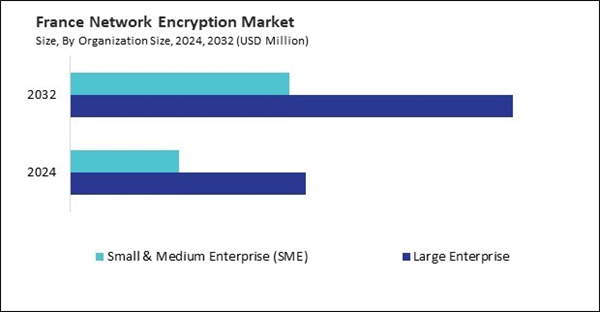The Germany market dominated the Europe Network Encryption Market by country in 2024, and is expected to continue to be a dominant market till 2032; thereby, achieving a market value of $494.9 million by 2032. The UK market is experiencing a CAGR of 6.8% during 2025-2032. Additionally, the France market is expected to exhibit a CAGR of 8.7% during 2025-2032.
In government and defense operations, the stakes for secure communication are even higher. National security agencies and military units transmit classified information across diverse and often global networks. Here, encryption protocols are typically more advanced, including custom algorithms, military-grade cryptography, and air-gapped secure communications. Network encryption is also critical for diplomatic missions and international collaboration, where secure video conferencing, email, and data exchange are required to prevent espionage and political fallout.
The corporate and enterprise sector forms one of the largest customer bases for network encryption. Businesses use encryption to protect internal communications, virtual meetings, supply chain data, and cloud-based services. With the rise of remote and hybrid work models, employees accessing corporate networks from home or on mobile devices necessitate secure VPNs and encrypted tunnels. Encryption also helps businesses meet compliance requirements such as GDPR in the EU and CCPA in California, reinforcing trust among customers and stakeholders.
The Europe network encryption market has steadily evolved as one of the most critical components of the continent’s digital security infrastructure. Initially driven by the need to secure military and governmental communications, network encryption has since permeated nearly every sector, including finance, healthcare, telecommunications, and energy. As Europe embraced digital transformation, the focus shifted from isolated encryption systems to integrated, network-wide encryption solutions. Early adoption was spurred by the increasing volume of sensitive data transmitted over public and private networks, which necessitated strong protective measures. Encryption technologies originally centered around securing emails and virtual private networks (VPNs), but these have now expanded to include more complex layers, such as optical encryption at Layer 1, Ethernet encryption at Layer 2, and IP-level security at Layer 3.
List of Key Companies Profiled
- Palo Alto Networks, Inc.
- Fortinet, Inc.
- McAfee Corp.
- CrowdStrike Holdings, Inc.
- Cisco Systems, Inc.
- IBM Corporation
- Check Point Software Technologies Ltd.
- Rapid7, Inc.
- Broadcom, Inc. (Symantec Corporation)
- Kaspersky Lab
Market Report Segmentation
By Organization Size
- Large Enterprise
- Small & Medium Enterprise (SME)
By Component
- Hardware
- Solutions & Services
By Deployment Mode
- On-premises
- Cloud
By End-user Industry
- Telecom & IT
- BFSI
- Government
- Media & Entertainment
- Other End-user Industry
By Country
- Germany
- UK
- France
- Russia
- Spain
- Italy
- Rest of Europe
Table of Contents
Companies Mentioned
- Palo Alto Networks, Inc.
- Fortinet, Inc.
- McAfee Corp.
- CrowdStrike Holdings, Inc.
- Cisco Systems, Inc.
- IBM Corporation
- Check Point Software Technologies Ltd.
- Rapid7, Inc.
- Broadcom, Inc. (Symantec Corporation)
- Kaspersky Lab









